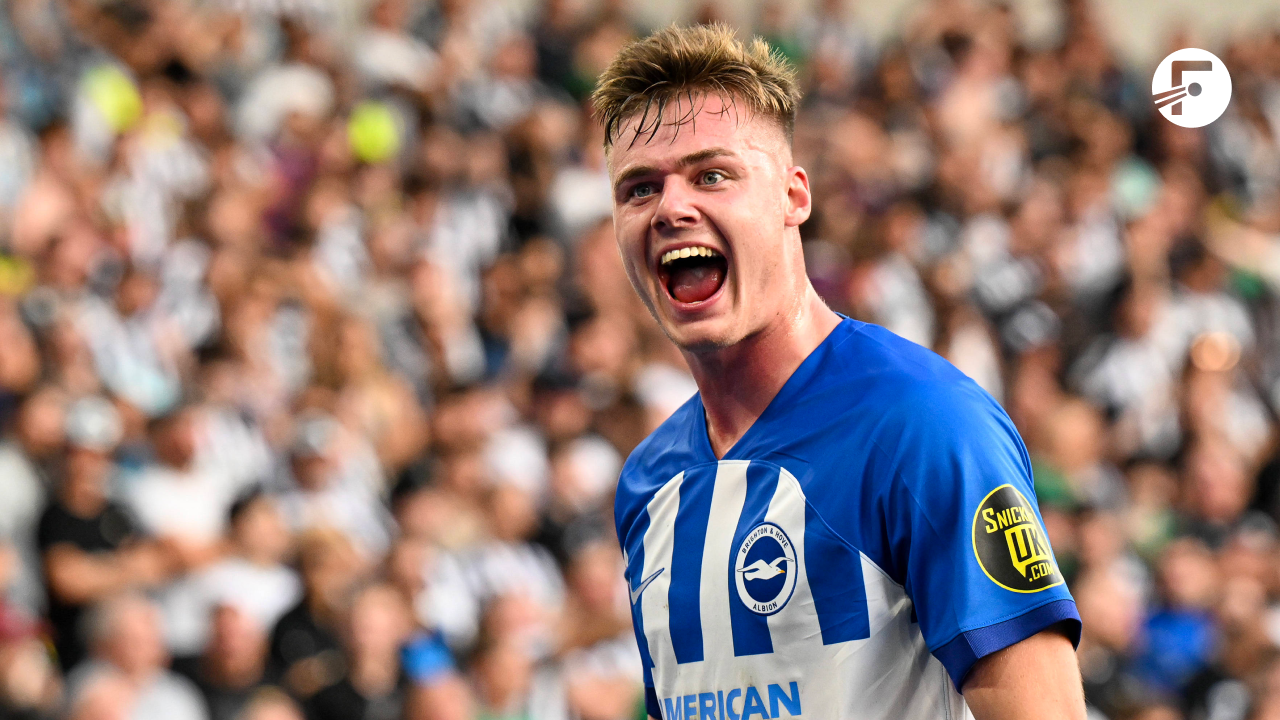Brighton won their first Premier League game in over two months on Saturday.
By Sam McGuire, Premier League expert
The Seagulls went to the City Ground to face Nottingham Forest on a six-match winless run following their 3-1 victory over Bournemouth on September 24th. Roberto De Zerbi’s side had lost just twice – 5-1 to Aston Villa and 2-1 to Manchester City – but the draws against Fulham, Sheffield United and Everton played a significant part in halting their early season momentum.
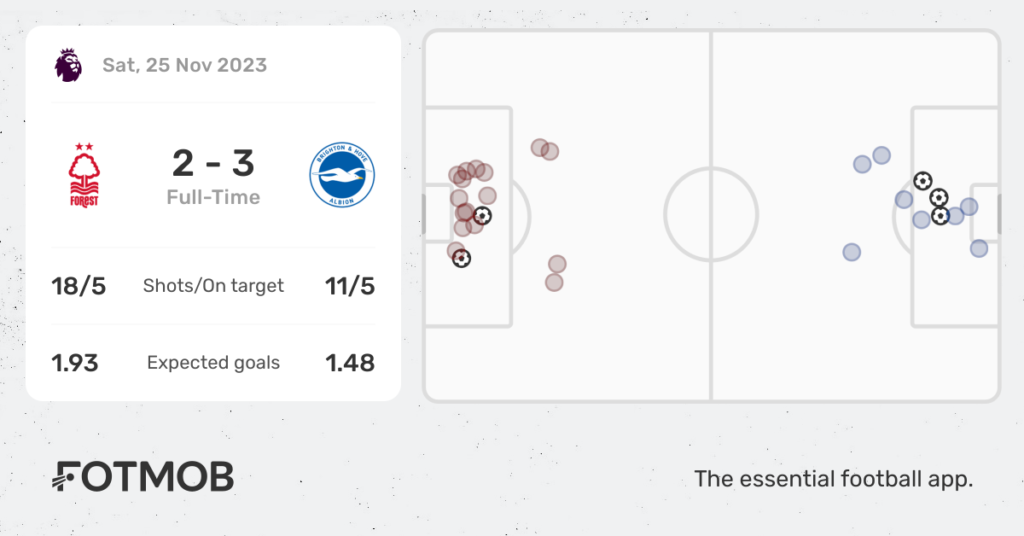
They are still eighth in the Premier League table but after taking 15 points from the opening six matches, many wondered whether they might gatecrash the top four this term after claiming sixth spot last season.
Despite falling behind to a third-minute Anthony Elanga effort, Brighton claimed a 3-2 victory. Evan Ferguson scored his sixth of the Premier League season while summer signing João Pedro came off the bench to notch twice to take his tally to eight across all competitions.
The pressure wasn’t mounting on De Zerbi, he’s still one of the most highly sought-after managers in the English top-flight, but it was a big three points for him and his team on Saturday. He has so far escaped scrutiny having banked a fair amount of credit last season but that won’t last forever. Sooner or later, people are going to realise just how much of a problem Brighton have defensively.
We’re a third of the way into the 2023/24 campaign now and the sample size is large enough to make some observations. For example, Brighton are yet to keep a clean sheet in the Premier League this season. In fact, the last time the Seagulls managed to shut out the opposition in a league match was on May 14th in the 3-0 win over Arsenal.
They are now 17 games without a clean sheet in the top flight of English football – almost half a season.
Furthermore, no team in the top 10 have conceded more goals than Brighton (23).
Not only are they struggling to keep clean sheets, but they are also struggling to limit their opponents to just one goal once they have conceded.
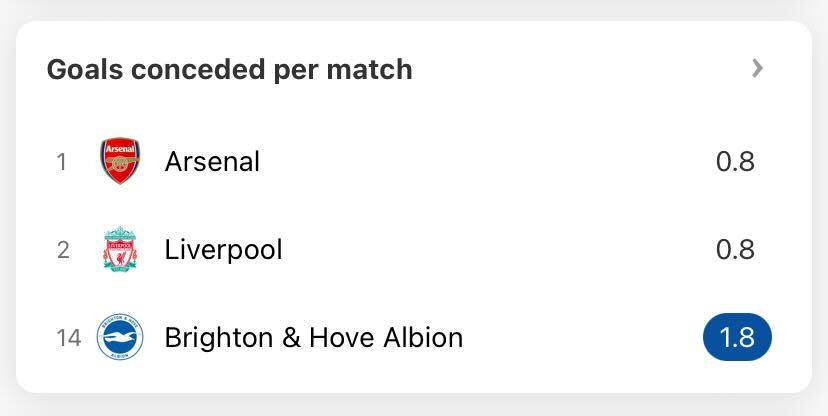
In fact, only three teams have conceded more goals than the Seagulls this season and two of them are in the bottom three – Bournemouth (28), Sheffield United (34) and Burnley (32). On a per 90 basis, that works out at 1.8 for Brighton, 2.2 for the Cherries, 2.5 for Vincent Kompany’s side and 2.6 for the Blades.
If you extrapolate that over a 38-game campaign, De Zerbi and his players are on course to concede almost 69 goals this season at their current rate. For context, last season Brighton conceded 1.4 goals per 90 and allowed 54 goals in total. That is a difference of 15 goals.
Of course, Brighton lost key players in the summer with Moises Caicedo and Alexis Mac Allister leaving for Chelsea and Liverpool respectively. But The Seagulls did spend some money to bring in Carlos Baleba, Bart Verbruggen, João Pedro and Igor. Ansu Fati joined on loan while Mahmoud Dahoud and James Milner arrived on free transfers. There was always going to be something of a drop off, but this is stark, isn’t it?
Even the underlying numbers paint a depressing picture for Brighton this season. They have an Expected Goals (xG) Conceded average of 1.48 this season, which means they are on course to finish the campaign with an xG Conceded total of 57. Last term, their per 90 average was 1.35. A difference of 0.15 might not seem like much but it equates to almost six over a 38-game sample size.
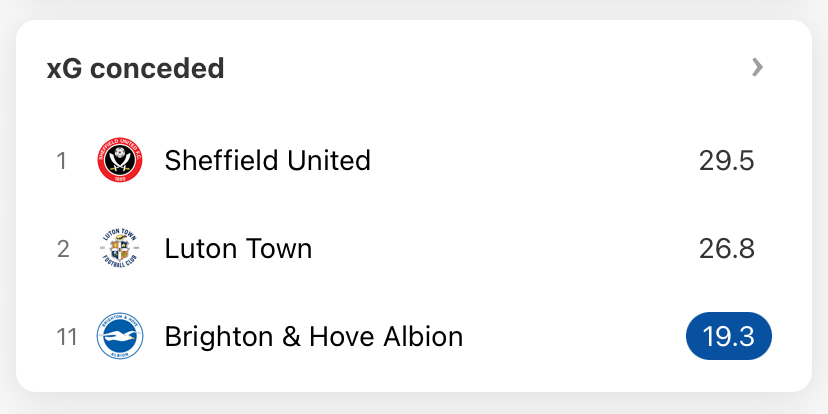
You also have to consider the fact Brighton have had favourable fixtures in their opening 13 matches. They played Liverpool, West Ham, Newcastle United as well as three of the bottom five teams at home. Despite this, they are struggling in their defensive third. This could well be because of what is going on in the offensive third.
De Zerbi likes his side to smother the opposition. Last season they ranked first for Passes Per Defensive Action (PPDA) in the Premier League. This metric essentially shows how many passes a team allows the opposition before they look to stop their progress. The more aggressive you set up a team to press, the lower the PPDA number will be. During the 2022/23 campaign, Brighton had an average of 8.4. So far this season, they are at 9.8 and this figure sees them rank fifth.
Basically, there is less pressure on the ball. This is backed up by the Posessions Won in the Final Third metric. Last season, the Seagulls were fifth with an average of 5.4, this time around they are 11th with an average of five. They have dropped off a little while other sides have become more aggressive in pinning their opponents high up the pitch.
Now, this isn’t as simple as saying Brighton are weaker defensively because they sold Mac Allister and Caicedo but those two were important to the way De Zerbi set his side up. Both performed well in and out of possession, with the World Cup winner deceptively good at regaining possession. The Seagulls have signed talented players to replace the duo but those who have replaced them aren’t as individually dominant as their predecessors. As a result of this, Brighton aren’t as dominant as a team and we’re seeing what happens when key cogs aren’t adequately replaced.
If De Zerbi wants his side to get back to the highs of last season, a tactical tweak to help shore up midfield might be needed. If he doesn’t do that, a Europa League place might be the ceiling for this talented squad.
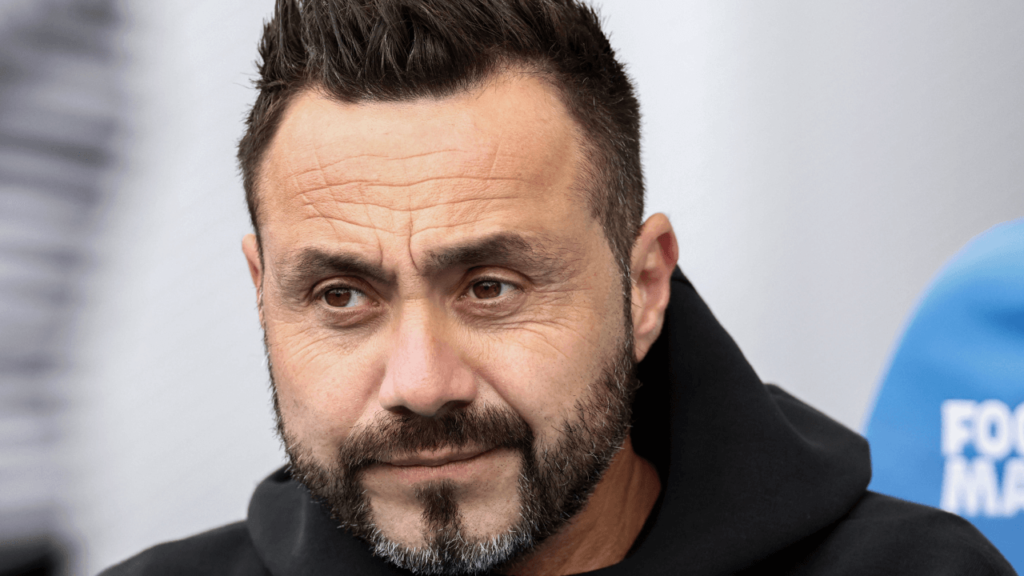
(Cover image from IMAGO)
You can follow every match from the Premier League live with FotMob — featuring deep stats coverage and player ratings. Download the free app here.
